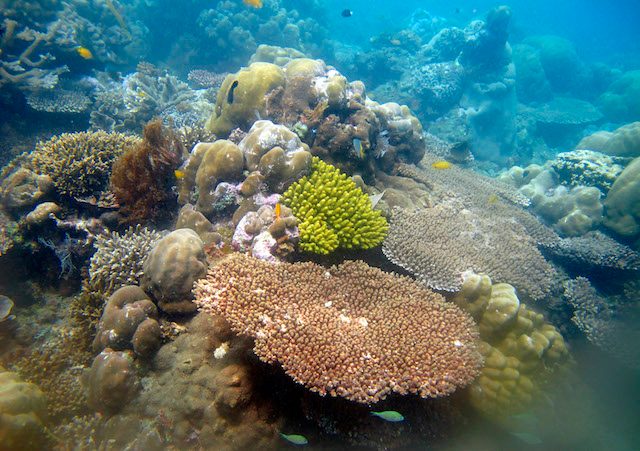SUMMARY
This is AI generated summarization, which may have errors. For context, always refer to the full article.

JAKARTA, Indonesia – A group of international scientists have discovered 15 “bright spots” – areas where there are a lot more fish on coral reefs than expected, based on their exposure to pressures like human population, pollution, and changing climate in the earth’s oceans.
These “bright spots” were found in the Pacific Ocean in places like the Solomon Islands, parts of Indonesia, Papua New Guinea and Kiribati.
“Given the widespread depletion of coral reef fisheries globally, we were really excited to find these bright spots that were faring much better than we anticipated,” said lead author Josh Cinner from the ARC Center of Excellence for Coral Reef Studies at James Cook University in Queensland, Australia.
Indonesia, the world’s largest archipelago is home to nearly 14% of the world’s coral reefs, which supports an immense diversity of marine life.
These ‘bright spots’ offer hope and solutions to researchers and scientists in their pursuit of reviving coral life globally.
“Many bright spots had strong local involvement in how the reefs were managed, local ownership rights, and traditional management practices,” said co-author Christina Hicks, an affiliated researcher at the Center for Ocean Solutions currently at England’s Lancaster University.
Hicks was referring to recent efforts taken by a few countries in the Pacific Ocean including Indonesia, Philippines, Malaysia, and Papua New Guinea to form the Coral Triangle Initiative to address the imminent threats present to coral life.
Indonesian efforts
Last month at the UN Environment Assembly, Indonesia led its first global environment resolution towards protection of endangered marine life and coral reefs in particular in Nairobi, Kenya.
These are just a few of the steps the government has taken in recent years to promote sustainable growth of marine ecosystems.
However, the study also discovered some “dark spots”, which were more globally distributed and found in every major ocean basin.
“Dark spots also had a few defining characteristics; they were subject to intensive netting activities and there was easy access to freezers so people could stockpile fish to send to the market,” Hicks said.
Based on a survey by the Indonesian Institute of Sciences, more than half of the coral reefs in Indonesia’s waters are damaged. This raises a strong alarm for the government, since a large part of the population relies on these marine ecosystems for their living. – Rappler.com
Add a comment
How does this make you feel?
There are no comments yet. Add your comment to start the conversation.